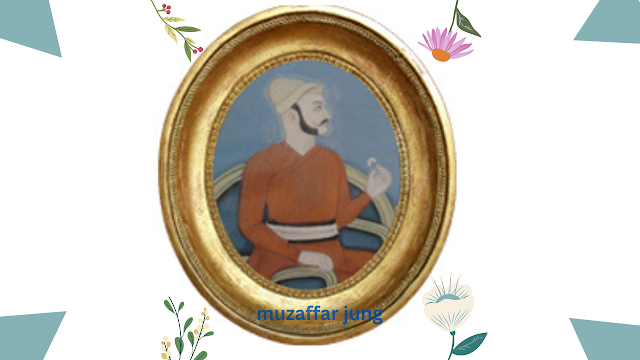Muzaffar Jang, who temporarily held the position of Nizam of
Hyderabad, was a significant figure in the Deccan during the 18th century. The power
dynamics of South India during this time were significantly influenced by his
involvement and alliances with European nations, particularly the French.
Birth and Background
Muzaffar Jang’s full name was Nawab
Mir Hidayat Muhi-ud-din Sa'adullah Khan Bahadur. He was the grandson of the
first Nizam of Hyderabad, Asaf Jah I (also known as Mir Qamar-ud-din Khan). His
father, Nawab Talib Muhi-ud-din Mutawassil Khan, was Asaf Jah’s second son.
Muzaffar Jang’s exact birth date remains uncertain, but he was likely born
around the early 18th century.
Reign and Rise to Power
Muzaffar Jang’s path to power was
complex, influenced by both familial alliances and the competing interests of
European colonial powers. After his grandfather, Asaf Jah I, passed away in
1748, a succession conflict emerged. Muzaffar Jang’s uncle, Nasir Jung,
initially claimed the title of Nizam. However, with support from the French,
who were then vying for influence in the Deccan region, Muzaffar Jang
challenged his uncle’s claim, resulting in a struggle for power.
In 1750,
during a battle against Nasir Jung's forces, Nasir Jung was killed, allowing
Muzaffar Jang to declare himself the Nizam. However, his reign was short-lived,
lasting only from 1750 to 1751. Just a few
months after taking power, he faced a rebellion by local chiefs. During a
skirmish near Kurnool in early 1751, Muzaffar Jang was killed in battle.
Family
and Succession
Muzaffar Jang's family, the Asaf Jahi, would go on to dominate Hyderabad for
more than 200 years. He belonged to a powerful lineage as the grandson of Asaf
Jah I. With ongoing French assistance, Salabat Jung, another grandson of Asaf
Jah I, was selected as the new Nizam upon the passing of Muzaffar Jang. A
pivotal moment in Hyderabad's and South India's political history was this
continuous alliance with the French.
BajiRao II: The Last Peshwa of the Maratha Empire

.jpg)
